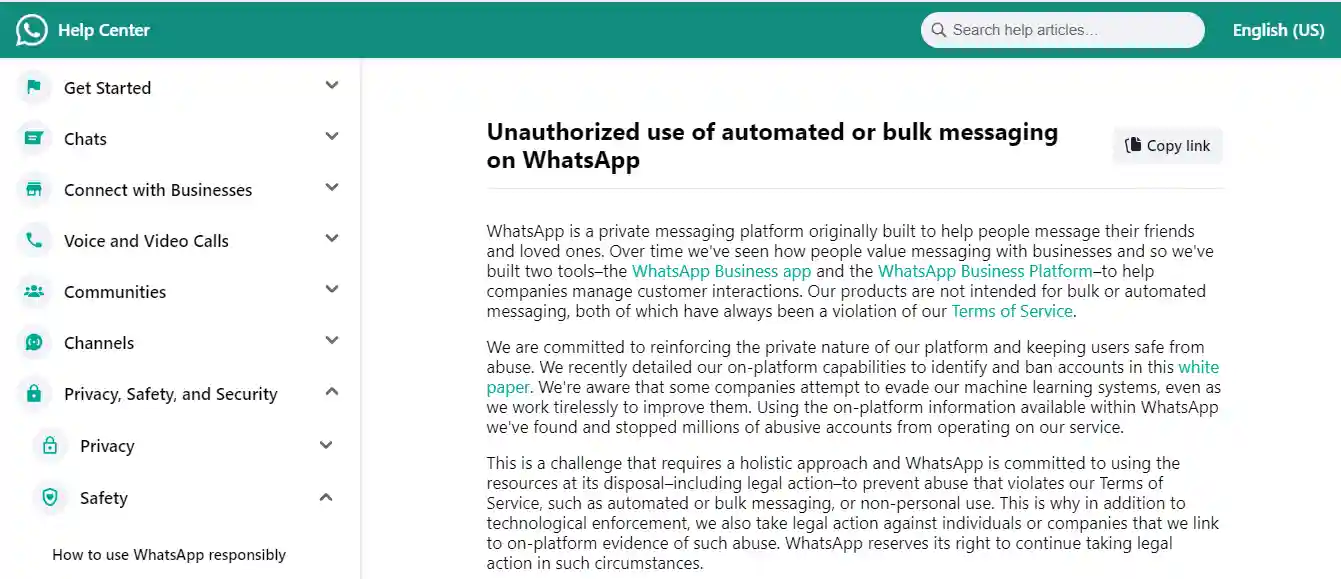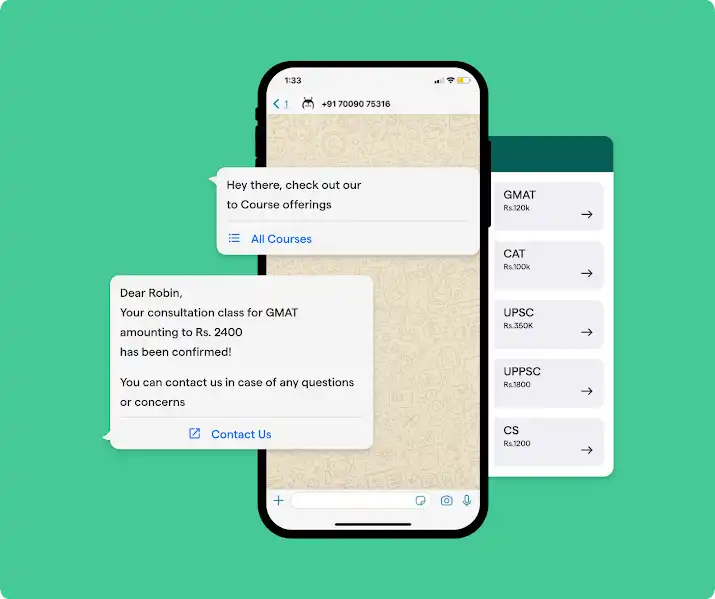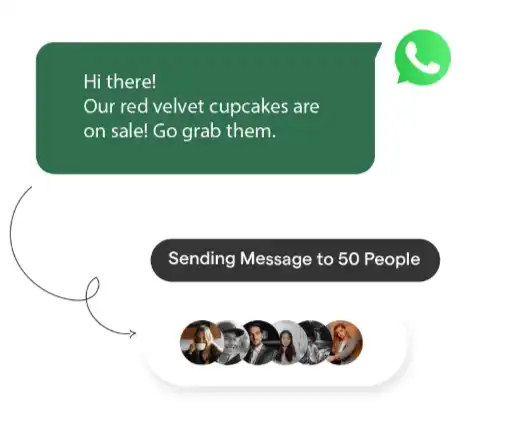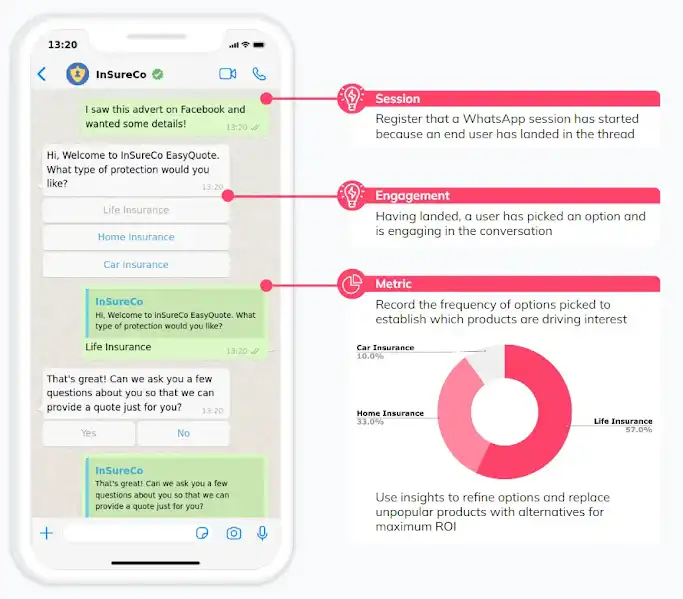Introduction
Sending a large number of messages in a short time frame or sending messages to large groups without proper management can lead to being banned.
This guide covers everything you need to know - from understanding WhatsApp's rules to building a quality subscriber list.
You'll learn how to craft engaging messages that don't trigger spam filters. And you'll get tips on scheduling, segmenting, personalizing and monitoring your campaigns.
By following the guidelines, you can run successful bulk messaging on WhatsApp without getting banned. Respect their regulations and add value for your readers.
Read on to uncover legal, practical strategies for WhatsApp marketing in practice. This way, you can keep your account safe and get some real results.
Understanding WhatsApp's Policies

Before embarking on any whatsapp bulk messaging campaign, it is crucial to understand WhatsApp's policies and comply with its rules and regulations. As an overview, WhatsApp's terms of service and acceptable use policy prohibit the following:
Sending messages to individuals who have not subscribed to receive them
Sending spammy or unsolicited messages
Using automated or bulk messaging tools to send messages
Adhering to these policies is essential to maintain your account's credibility and avoid getting banned from the platform.
Next, we will cover the importance of Deliverability and Delivery Rate in whatsapp bulk messaging.
Importance of Deliverability and Delivery Rate
Deliverability and delivery rate are critical metrics to monitor when whatsapp bulk messaging.
Deliverability refers to the percentage of messages sent that successfully reach the intended recipients, while delivery rate represents the percentage of successfully delivered messages.
Several factors can impact deliverability and delivery rates. These factors include:
The quality and relevance of your messaging list
The content of your messages and whether they comply with WhatsApp's policies
The number of messages sent in a given time frame
Recipients' engagement behavior
To optimize deliverability and delivery rates, you should follow these best practices:
Build a targeted messaging list: Ensure that your whatsapp bulk messaging list contains recipients who have opted in to receive your messages.
The more relevant and engaged your audience, the higher the chances of your messages being delivered successfully.
Send compliant and engaging messages: Create compelling messages that comply with WhatsApp's policies and are customized for your target audience.
Schedule your messages appropriately: Sending too many messages quickly or during non-active hours can harm your deliverability and delivery rate.
Segment and personalize your messages: Segment and segment them based on your recipients' interests and engagement levels.
Monitor and analyse your campaign performance: Monitor your whatsapp bulk messaging performance and continuously analyze your campaigns' performance metrics to optimize them.
Adhering to these best practices can improve deliverability and delivery rates and ensure that your bulk messaging campaigns meet their intended objectives.
Next, we will cover some best practices for Building whatsapp bulk messaging Lists.
Best Practices for Building WhatsApp Messaging Lists

Building a targeted messaging list is crucial for the success of any Bulk Messaging campaign. Here are some methods and strategies to grow your WhatsApp bulk messaging list:
Use various channels to promote your WhatsApp opt-in: Use social media, your website, and other marketing materials to promote your WhatsApp opt-in and encourage potential subscribers to join your list.
Offer incentives: Offer exclusive discounts, content, or promotions for those who have opted-in to receive your messages.
Host events: Use events to encourage sign-ups and promote your WhatsApp number throughout the event.
Leverage existing databases: If you have a database of customers or leads, consider using these lists to promote your WhatsApp opt-in.
To acquire opt-in permissions from users, follow these best practices:
Be transparent: Inform users what types of messages you’ll send, how often and in what format.
Make opting-in easy: Provide clear instructions and include a link or QR code to your opt-in page to make subscribing quick and painless.
Next, we will cover how to craft, engage and Compliant whatsapp bulk messaging.
Crafting Engaging and Compliant Bulk Messages

Crafting compelling bulk messages can help you communicate effectively with your audience and build their engagement with your brand.
Here are some guidelines for creating engaging and compliant bulk messages:
Keep it brief: Write short, concise messages that are easy to read and understand.
Personalize your messages: Address recipients by name or group them based on their interests or behaviour.
Use clear and action-oriented language: Encourage recipients to take action with clear CTAs.
Avoid spammy content: Ideally, your messaging list should only include subscribers who have given permission to receive your messages. Avoid using “spammy” or click-bait content.
To avoid triggering spam filters and being perceived as spam, follow these tips:
Don’t overuse caps, exclamation points or symbols.
Don't include suspicious links or attachments in your messages.
Avoid using automated or generic messages.
Limit the frequency of your messages.
And, to implement effective bulk messaging automation, you need two things at one place: A well-integrated CRM and an effective bulk message sender.
And BotPenguin can do both of these things!
By integrating a CRM with your chatbot you can set up drip campaigns and send bulk messages on platforms that are convenient for your customers. Because BotPenguin provides no code AI chatbots for multiple platforms like:
- WhatsApp Chatbot
- Facebook Chatbot
- Wordpress Chatbot
- Telegram Chatbot
- Website Chatbot
- Squarespace Chatbot
- Woocommerce Chatbot
- Instagram Chatbot
- MS-Teams Chatbot
- Shopify Chatbot
Next, we will see the tips for Scheduling and Timing Bulk Messages.
Scheduling and Timing Bulk Messages
Sending your messages at the right time can make all the difference in your campaign's effectiveness. Here are some best practices for scheduling and timing your bulk messages:
Send messages during active hours: Ideally, send messages during business hours or when your target audience is most active.
Consider the recipient's time zone: If you have an international audience, take into account their time zones.
Avoid sending too many messages at once: Sending too many messages at once can trigger WhatsApp's spam filters and harm your deliverability and delivery rates.
Segment your audience: Group your recipients based on their location, interests, or behaviour and schedule messages accordingly.
By following these best practices, you can optimize your WhatsApp Bulk Messaging campaign and improve your chances of success.
Utilizing Personalization and Segmentation
Personalization and segmentation are key techniques for creating successful WhatsApp messaging campaigns.
By personalizing your bulk messages, you show recipients that you value their individual needs and interests.
By segmenting your list, you can target specific groups of recipients with relevant content, improving engagement and conversion rates.
Here are some of the benefits of personalizing and segmenting your bulk messages:
Higher engagement rates: Personalized and segmented messages increase engagement rates by appealing to specific recipient needs and interests.
Better conversion rates: Personalized and segmented messages lead to better conversion rates as they are more relevant and targeted to the recipient.
Improved relationships: Personalized and segmented messages show that you value each recipient as an individual, which helps to build positive relationships.
To create tailored messages for different recipient groups, follow these techniques:
Group recipients based on their interests, location, or behavior.
Use dynamic content to tailor your messages to each of the recipient groups.
Personalize each message with the recipient's name or other relevant information.
Use preview messages to catch the recipient's attention.
Next, the tip we will cover is how to monitor and analyze message campaigns.
Monitoring and Analyzing Messaging Campaigns

It's essential to track and analyze your WhatsApp messaging campaigns to understand which messages are performing well and which are not.
This helps you make data-driven decisions to optimize your campaign and improve your chances of success.
Here are some tools and metrics to measure success and make data-driven decisions:
WhatsApp Business API: It provides metrics, such as delivery rate, open rate, read rate, and response rate, to track campaign effectiveness.
Google Analytics: If you have a web-based opt-in process, you can track user behavior using Google Analytics.
Customer Feedback: Ask your audience for feedback on your messaging campaigns. Use the feedback to optimize your campaigns.
By tracking and analyzing your messaging campaigns, you can monitor their effectiveness, spot and rectify problems early, and make data-driven decisions to optimize your campaigns.
Suggested Reading:
WhatsApp Bulk Messaging: The Ultimate Guide for 2024
Proactive Steps to Stay Unbanned
It is essential to take proactive measures to avoid being banned by WhatsApp. WhatsApp is strict about its policies, and even a minor violation can lead to a ban. A ban can impact your messaging campaigns' ability to reach your audience and harm your business.
Here are some actions to take to prevent being banned by WhatsApp:
Know and follow WhatsApp's policies: Read WhatsApp's policies and ensure that your messaging campaigns comply with them.
Avoid spam-like content: Avoid using spammy content and limit the frequency of your messages.
Use opt-in subscribers only: Ensure your messaging list includes those opted-in to receive your messages.
Monitor your metrics: Keep track of delivery rates, response rates, and other metrics to identify any potential issues early on.
In case of a ban, handle the situation calmly and act according to WhatsApp's guidelines to resolve it as quickly as possible. Promptly addressing issues can minimize the impact of a ban and allow you to resume business operations quickly.
Conclusion
WhatsApp is a marketing powerhouse that can be harnessed effectively when used correctly. This guide demonstrated a way of doing this without becoming caught by policies.
Implement these best practices: build active subscriber lists, craft compelling messages, and consistently monitor your campaigns.
Consider utilizing marketing automation tools like BotPenguin to streamline rapid list growth, personalize campaigns at scale, and ensure compliance. This allows you to focus on strategic planning while the AI assistant handles message delivery.
With BotPenguin's assistants taking the messaging load off your hands, you can spend more time on strategy and less on execution. What is the purpose of doing everything yourself when you can have an AI greatly help you?
Let's get WhatsApp Marketing right! Kick-start your business with BotPenguin today to have a definite advantage over other businesses. Our innovation is the lever that will make WhatsApp to fully realize its potential.
Suggested Reading:
A Guide on WhatsApp Broadcast vs WhatsApp Bulk Messaging
Frequently Asked Questions (FAQs)
How often should I send out WhatsApp Bulk Messages?
Sending messages too frequently can be considered spammy, so it is essential to avoid sending too many messages too often. Limit your messages to relevant and timely communications.
How can I ensure that my WhatsApp messages comply with WhatsApp's policies?
Ensure that all WhatsApp Bulk Messaging comply with WhatsApp's policies by reviewing them regularly, tracking updates, and ensuring that your communications are relevant and timely.
What should I do if I get banned on WhatsApp?
If you get banned on WhatsApp, follow WhatsApp's guidelines and procedures to resolve the issue promptly. Reacting calmly and resolving issues promptly can help mitigate the impact of a ban.
What are some effective ways to avoid being banned by WhatsApp?
To avoid being banned by WhatsApp, you must comply with its policies, avoid spammy content, and limit the frequency of messages to opted-in subscribers only.
Is it safe to use third-party tools for WhatsApp bulk messaging?
Exercise caution with third-party tools, ensuring they comply with WhatsApp's policies to prevent potential bans.
What role does user consent play in WhatsApp bulk messaging?
Obtain explicit consent from users before sending bulk messages to maintain compliance and avoid bans.


